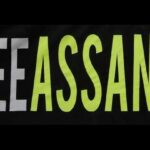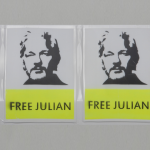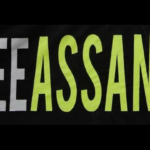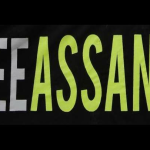Hands Off Assange! US and UK Citizens Stand in Solidarity with Truth-Teller
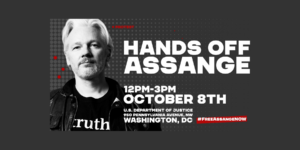
Many had high hopes that current Australian Prime Minister, Anthony Albanese, would make good on his pre-election rhetoric calling for an end to the persecution of award-winning Australian journalist Julian Assange, by pressuring the United Kingdom to allow him to return to his homeland.
But those hopes were dashed in the eyes of many after a senate probe found that our PM had, like Australian leaders before him, hung the truth-teller out to dry – doing nothing of the sort.
US and UK citizens rally in support
With such complacency and, indeed, cowardice displayed by our leaders, and local rallies being unable to emphasise the importance of supporting those that stand up for the truth, thousands of citizens of the United States and United Kingdom plan to gather this weekend to keep the conversation relevant, with the hopes of Assange finally achieving justice.
The rally is being organised by Assange Defense, which has released the following statement:
“On October 8, 2022, supporters of WikiLeaks publisher Julian Assange in England will join hands to form a human chain surrounding Parliament in London. In solidarity, US-based supporters will hold a rally at the Department of Justice in Washington DC, calling on Attorney General Merrick Garland to drop the charges against Assange.”
The rally will commence at midday Washington time and is expected to end at 3pm.
There are also reports that a rally will be held outside Government House in Melbourne on Saturday, with Julian’s brother and his father speaking at the event.
High Court Appeal
Julian Assange is still detained in Belmarsh prison in London, where he has been imprisoned since April 2019 awaiting the outcome of an appeal in the UK’s High Court against the US and the UK Home Secretary Priti Patel, who approved his extradition to the US in June this year.
Mr Assange’s defence team is arguing that he is “being prosecuted and punished for his political opinions”.
It’s fair to say that there are hundreds of thousands of people around the world who wholeheartedly agree, including the President of Mexico, Andrés Manuel López Obrador who recently used Mexico’s Independence Day celebrations to honour Julian Assange.
UN human rights chief, Michelle Bachele, who recently met with Mr Assange’s lawyers in Geneva, has also spoken publicly in support of Mr Assange.
However, despite having these prominent supporters, little is actually being done to stop the prosecution of Assange – most notably from his home country.
Labor lacks courage to help Assange
When the Labor Party won the Federal Election earlier this year, it certainly raised hopes that something might finally be done to help Julian Assange who has been indicted on 17 espionage charges in the US and one charge of computer misuse over WikiLeaks’ publication of thousands of military and diplomatic documents, carrying a maximum sentence of 175 years in prison.
Prior to the election, Attorney-General Mark Dreyfus issued a statement saying that the Labor Party wanted the Assange matter ‘brought to an end’, while Labor leader Anthony Albanese, now the Prime Minister also declared at some point on the pre-election campaign trail that he couldn’t see any purpose to keeping Assange locked up.
However, since then, Labor has not raised the issue any further, or escalated it amongst its list of priorities, despite the fact that Prime Minister Albanese has already had a few face-to-face meetings with US President Biden – meetings that were potentially opportunities to bring the matter up.
Senate probe
In August this year, when Greens Senator David Shoebridge questioned the Government about what exactly was being done for Julian Assange, Labor’s Senate leader, Senator Don Farrell, repeated words that were eerily similar to the previous Morrison Government’s position that Australia cannot interfere in another country’s legal process, saying that “the extradition case is between the United States and the United Kingdom.”
And so here we are – failing to help one of our own who is facing very severe penalties over principles that we should, as a Western democracy, hold very dearly and defend fiercely – freedom of the press, freedom of political opinion and the public’s right to know.
Whistleblowers are persecuted when they should be applauded
There’s an uneasy irony around the fact that demonstrations will be held in the US this weekend, just days after the case against ATO whistleblower has begun in South Australia.
Richard Boyle is facing 66 criminal charges and a potential maximum sentence of 100 years in jail – after going public in 2018 about concerns over the Australian Tax’s Office’s debt collection tactics and their impact on ordinary Australians. The hearing that is currently before South Australia’s district court, is to determine whether Mr Boyle is protected by the Public Interest Disclosure Act (the PID) and immune from prosecution.
If the PID does not protect Mr Boyle, he will face a criminal trial.
Despite considering the review and possible reform of Australia’s whistleblower protections, Australian Attorney General, Mark Dreyfus, has so far refused to respond to calls to intervene and have the Boyle case dropped. It is within his powers to do so.
Similarly, nothing has been done to end the prosecution of former Australian Defence Force lawyer David McBride, who leaked information to the ABC in 2014 exposing war crimes committed by members of Australia’s Special Operations Task Group in Afghanistan..
Even though the independent Brereton Report which was published in 2020 – the result of a four-year long investigation – produced very similar findings to the information leaked by Mr McBride, including identifying at least 39 alleged murders of Afghan civilians and unarmed captured Afghan troops, and the cruel treatment of at least two more locals by SAS members, Mr McBride still faces criminal charges and the prospect of 50 years behind bars.
In the meantime, those soldiers who allegedly committed these war crimes have not been charged and so far, the prospect of them facing criminal prosecution does not seem very likely.
Different government, same pandering to the US
So now the question has to be asked whether we have politicians with real mettle who will stand up for the hallmarks of democracy, or whether we have elected another national government that is good at making pre-election promises and less effective at delivering on them.
Most Australians are not only concerned for the welfare of these individuals who are involved in long, protracted legal battles simply because they demonstrated significant courage in speaking out, but are outraged that Australia is increasingly persecuting whistleblowers instead of praising them.
What kind of democracy do we actually live in if people face prosecution for standing up for what they believe in and for highlighting information that is within the public interest?



